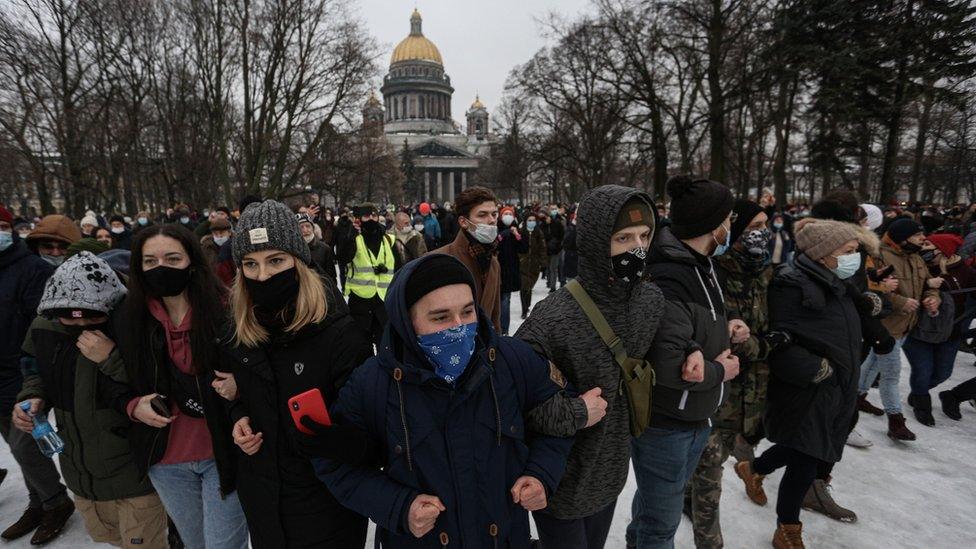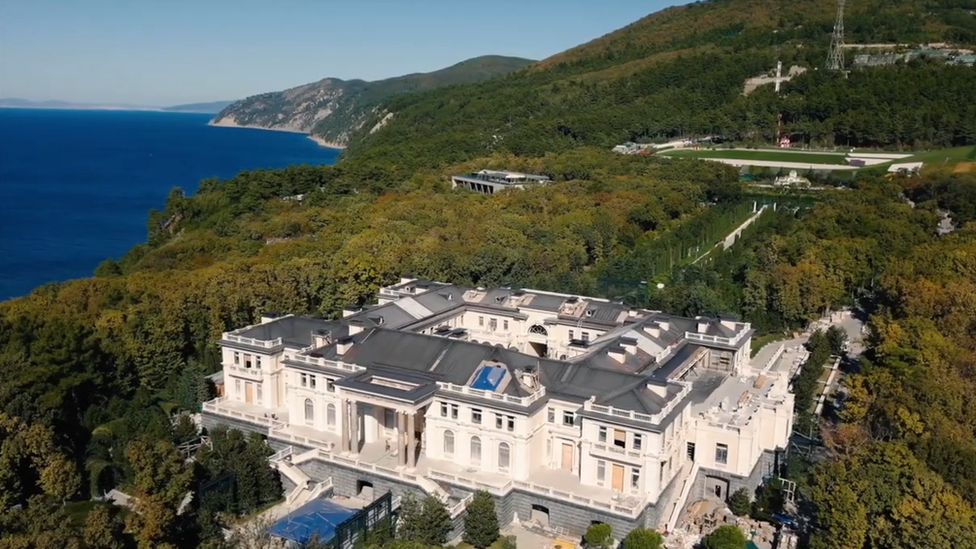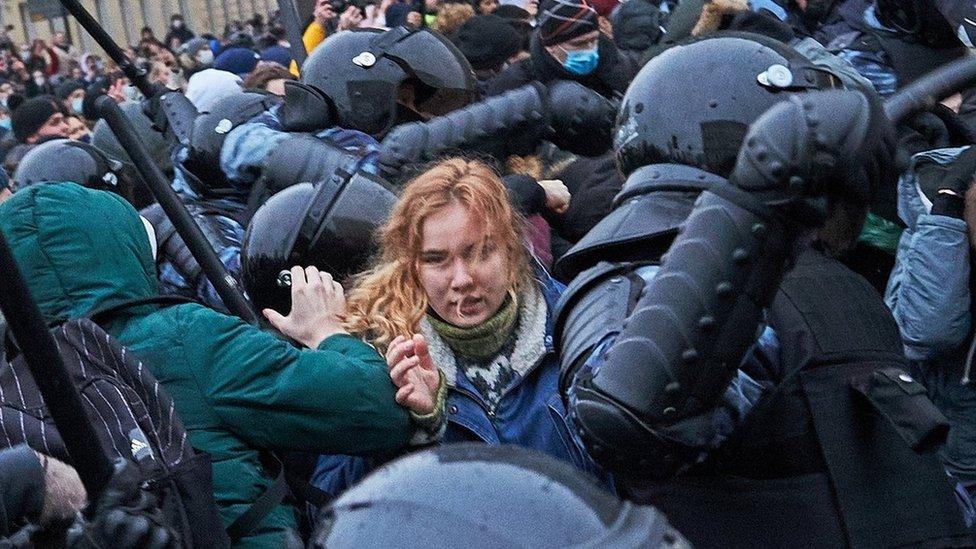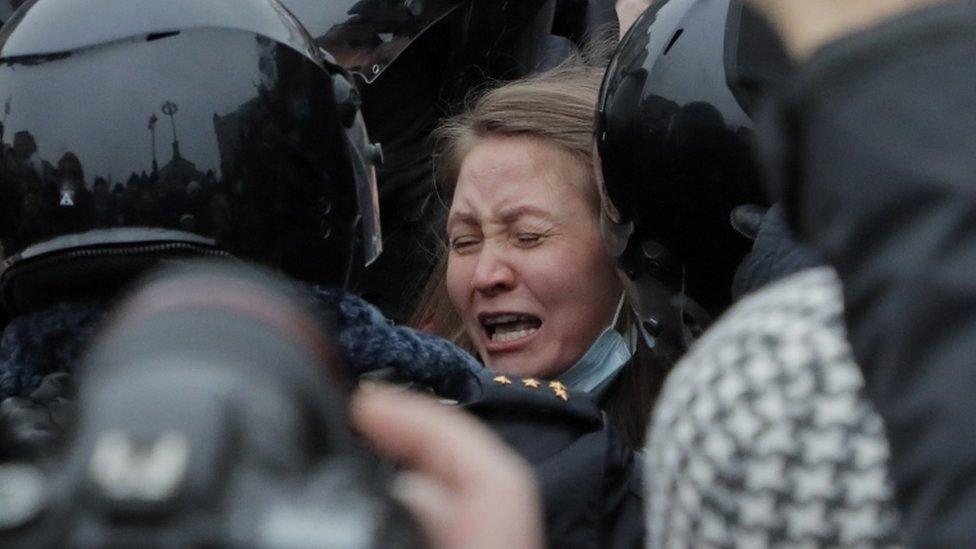Putin condemns Navalny protests as Western concern grows
- Published
Supporters of Kremlin critic Alexei Navalny protest against his arrest across Russia
Russian President Vladimir Putin has condemned as "illegal and dangerous" the mass rallies in support of jailed opposition leader Alexei Navalny.
Tens of thousands defied a heavy police presence to join the rallies across Russia on Saturday. More than 3,500 were detained, monitors say.
EU foreign ministers discussed the protests on Monday, but did not agree on further sanctions on Russia.
In Moscow riot police were seen beating and dragging away demonstrators.
The foreign ministers of Estonia, Latvia and Lithuania are demanding "restrictive measures against Russian officials responsible for arrests".
Poland's President Andrzej Duda also urged the EU to step up sanctions on Russia, external following the arrest of Mr Navalny. A week ago he was sentenced to 30 days in jail for violating parole conditions - a case he condemns as fabricated.
Mr Navalny, President Putin's most high-profile critic, called for protests after he was arrested at Moscow's Sheremetyevo airport, on arrival from Berlin on 17 January.
Demonstrations were held on Saturday in about 100 cities and towns from Russia's Far East and Siberia to Moscow and St Petersburg.
French Foreign Minister Jean-Yves Le Drian described the arrests as a "slide towards authoritarianism" and called for further sanctions against Russia.

Why ratcheting up EU sanctions takes time

"Change is in the air in Russia," declared Lithuania's new Foreign Minister Gabrielius Landsbergis, as he arrived for his first meeting with EU counterparts.
But he soon discovered that change is not always in the air in Brussels.
A couple of years ago, one seasoned Spanish politician lamented the meetings of the 27 EU foreign ministers as being "more a valley of tears" than a place for decision-making: "We express our condolence and concern… but no capacity for action comes out of it."
Unfortunately for that same politician - Josep Borrell - he's now the man who chairs these gatherings.
The EU has already imposed sanctions on six senior Russian officials - including the head of the FSB security service - over the nerve agent attack on Mr Navalny last August.
But MEPs are urging the EU to go further and hit Mr Putin's administration "where it really hurts - the money".
In December, the EU unveiled a tougher sanctions regime, including asset freezes and travel bans for foreign individuals accused of human rights violations. It puts the bloc alongside the US and UK, which adopted so-called Magnitsky Acts.
They take the name of the lawyer Sergei Magnitsky, who died in a Moscow prison in 2009 after reporting massive fraud by Russian tax officials. The EU version does not bear his name, to avoid alienating Russia-leaning member states.
Agreeing on EU sanctions is always tough, as it requires all 27 countries to agree and we're told no concrete proposal was discussed by foreign ministers today.

Observers say the scale of the Russia-wide demonstrations was unprecedented for recent years, and the Moscow protest was the capital's largest in almost a decade.
They appeared to enjoy widespread passive support, with trolley bus passengers waving to the crowds and large numbers of car drivers beeping their horns.

Protesters, like these in St Petersburg, braved freezing cold to rally for Mr Navalny
The protests were also notable for the high proportion of young Russians who turned out. Opposition rallies have attracted more young people since Mr Navalny began releasing online investigations into alleged government corruption.
One such investigation released last week claimed President Putin had spent illicit funds on an extravagant Black Sea palace. The film, which was posted on YouTube, external, has been viewed more than 85 million times. Mr Putin has denied having any links with the palace in question.
Many protesters said they were angered by the findings of that report, and chants of "Putin is a thief!" were heard during Saturday's demonstrations.
Social media also played a key role in driving young people - many of whom have only ever known a Putin-led Russia - to take to the streets. Posts promoting the demonstrations were viewed hundreds of millions of times on TikTok.
The flood of videos prompted Russia's official media watchdog, Roskomnadzor, to demand the app take down any information "encouraging minors to act illegally".
Mr Putin has said no underage children should take part in the protests: "One must under no circumstances push forward underage people. After all, it is terrorists who act like that, when they drive in front of them women and children. The emphasis is slightly different, but essentially, this is the same thing."
Police should also act within the law, he said.
No-one should seek to advance "their ambitious objectives and goals, particularly in politics" through protests, he added, in an apparent reference to Mr Navalny.

Mr Navalny's video report into this Black Sea resort has been viewed 85 million times
On Sunday Mr Putin's spokesman Dmitry Peskov criticised a message from the US embassy in Moscow warning people to avoid the demonstrations, branding the warning an "interference in our domestic affairs".
The embassy said such warnings were a "common and routine practice".
Meanwhile, the Russian embassy in the UK also accused Western nations of using their embassies to encourage the protests.
Allow X content?
This article contains content provided by X. We ask for your permission before anything is loaded, as they may be using cookies and other technologies. You may want to read X’s cookie policy, external and privacy policy, external before accepting. To view this content choose ‘accept and continue’.

- Published23 January 2021

- Published24 January 2021
